Have you noticed a crust of poop on your newly-hatched chicks’ vent? Pasty Butt, or pasting, is a widespread condition in baby chicks and could be fatal if left untreated. I’ve had to treat many of my young pasty butt chicks over the years and this came on the heels of losing my chicks because I didn’t know what to do.
Having a pasty butt chicken can be irksome. We also don’t want you to lose any chicks, so we’ve put this article together to help you deal with this condition among your chicks.
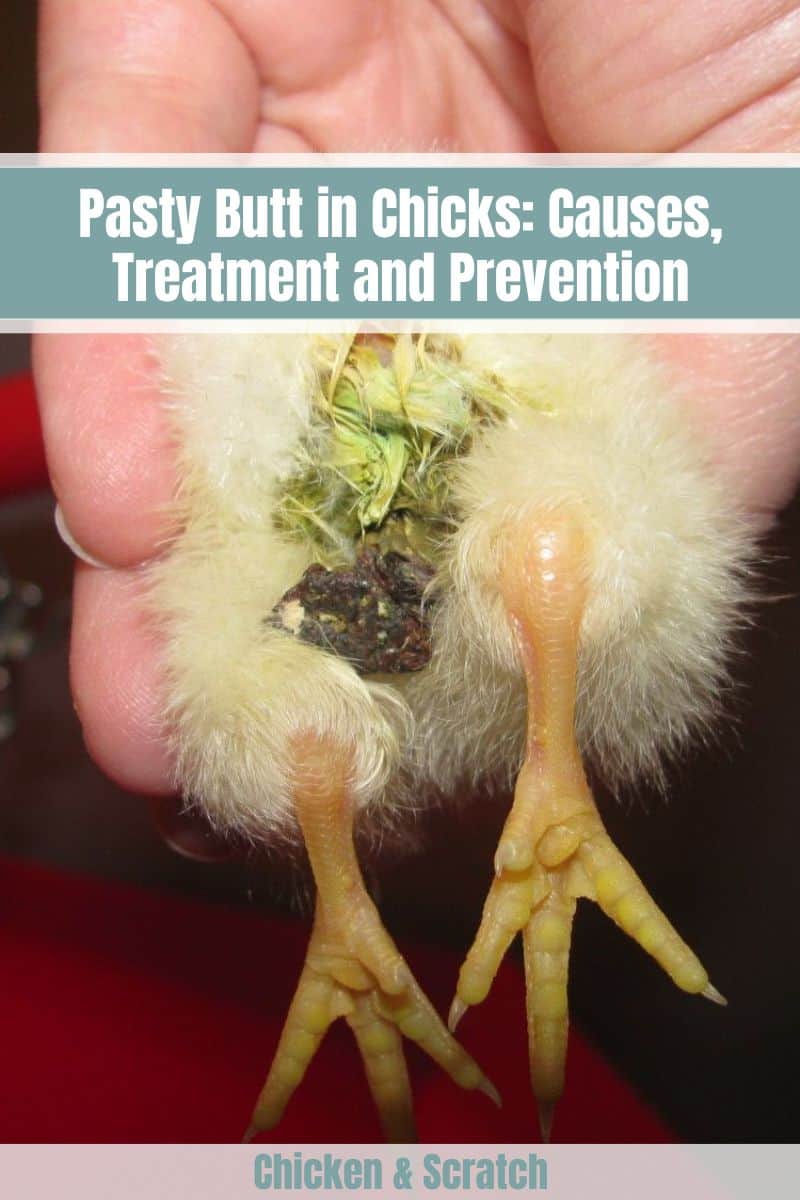
What is Pasting?
Pasting occurs when poop comes out of the vent and sticks to it instead of falling off. Over time, the poop builds up, and the butt becomes clogged. Consequently, it becomes impossible for the baby chick to release excreta, and this is dangerous to the chick’s health.
To safely remove pasting, you need to have a good understanding of the chicken’s anatomy. The chicken’s anatomy reveals an orifice (the vent) from which the chick passes out excreta. Many people mistake the vent for the belly button and vice versa. When cleaning up the chick’s pasting, it’s critical not to mistake one for the other.
You should also be careful not to tug at the chick’s belly button. In a newly-hatched chick, the belly button has a fold of tissue that should become dry and fall off in a couple of days. Pulling on this tissue could lead to disembowelment and fatal complications, so you have to be very careful.
Symptoms of Pasty Butt
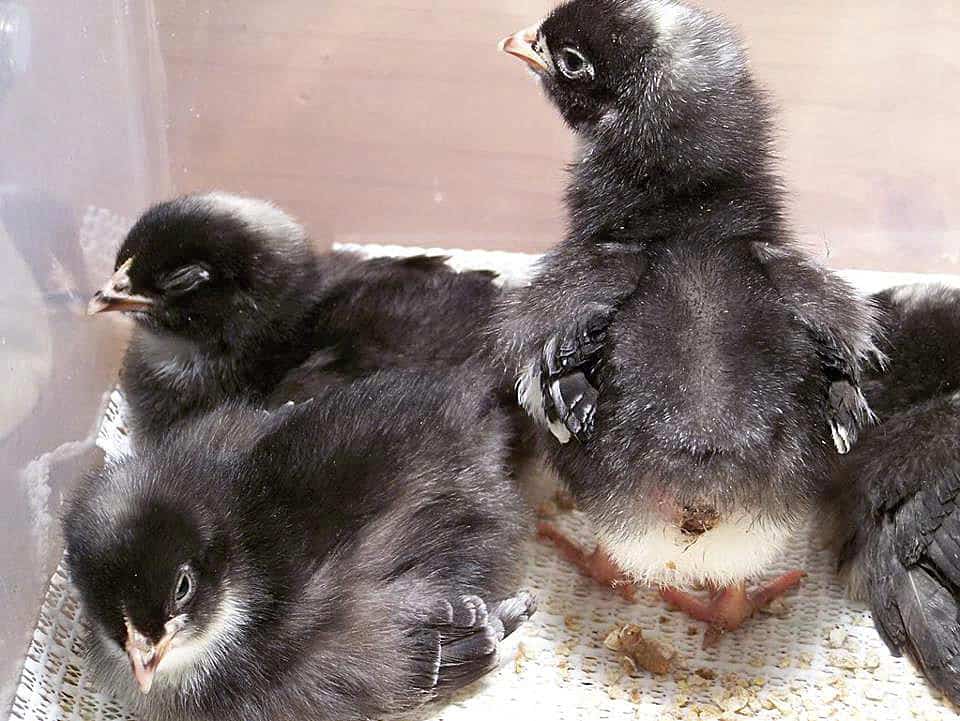
The earlier you spot pasty butt in your chick, the higher the likelihood of your chick’s survival. As such, you should always watch out for the following symptoms:
- Slow or absence of noticeable growth
- Lack of sleep
- General weakness, compared to other chicks
- Inability to feed or drink
- Protrusion of the vent
Noticing that your chick has a pasty butt before the manifestation of these symptoms is even better.
Causes of Pasty Butt
Pasting usually occurs in chicks that are less than three days old. However, some diseases can lead to pasty butt in chicks that are over a week old. It’s improbable for chicks raised by a brooder hen to get a pasty butt. The reason is simple: they are not affected by the stress of mailing and temperature changes.
The major causes of pasting in newly-hatched chicks are temperature change, stress, and improper dieting.
1. Temperature Changes
Baby chicks that are sent via mail usually experience a change in temperature that might clog their vents. Also, such chicks are usually dehydrated after a long journey, and giving them water that’s less than 95°F (35°C) can cause their butts to paste.
Besides temperature changes due to transportation, heat lamps, commonly used in chicken coops, can also cause the newly-hatched chicks to overheat, leading to a blockage in their orifice.
2. Poor Digestion
A major cause of pasting is the ingestion of food ingredients that are difficult for the chicks to digest. This results in the chicks having to excrete a more viscous and stickier poop that eventually remains on their butts.
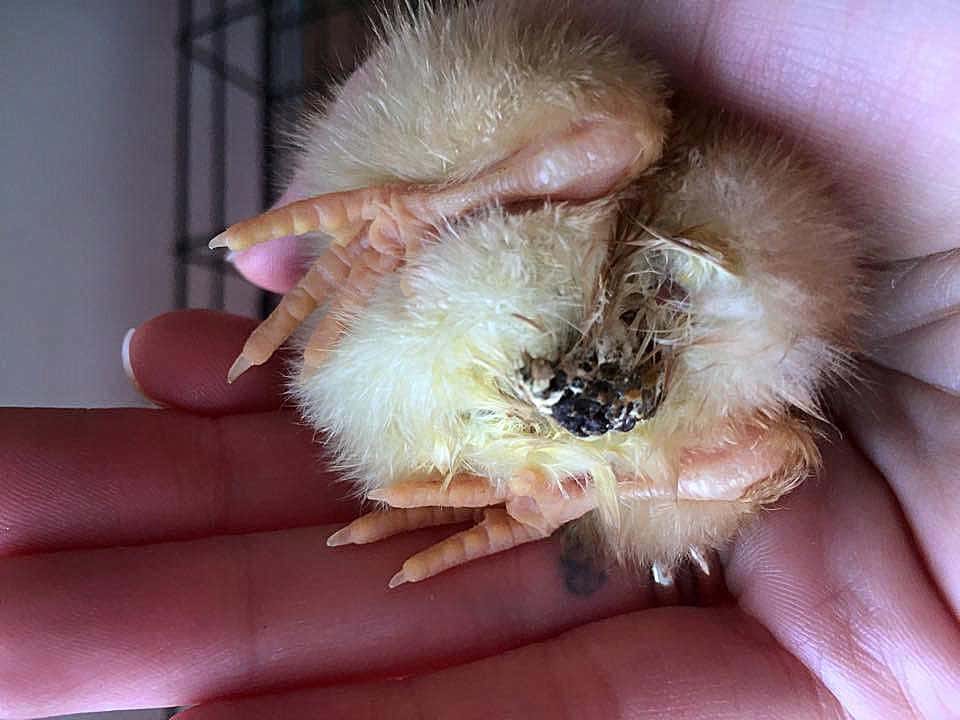
The common reason for this is the chick’s under-developed digestive system. Young chicks’ digestive systems aren’t fully developed with enough enzymes to break down these food materials. This explains why pasty butt isn’t common in birds over a week old as they are capable of producing enough digestive enzymes.
3. Improper Dieting
For some people, adding electrolytes to the drinking water of their chicks is an excellent way to enable them to recover from the stress of traveling.
While such medications are generally healthy for your chicks as they enhance immunity, excess electrolytes can lead to pasty butt. More often than not, what baby chicks need is fresh, clean water even when they show signs of disorientation.
In most cases, when you notice a recurring case of pasting in your chickens, it’s likely due to the type of feed they’re consuming. For instance, some feeds made from soybean have been reported by many poultry farmers to cause pasty butt in baby chicks.
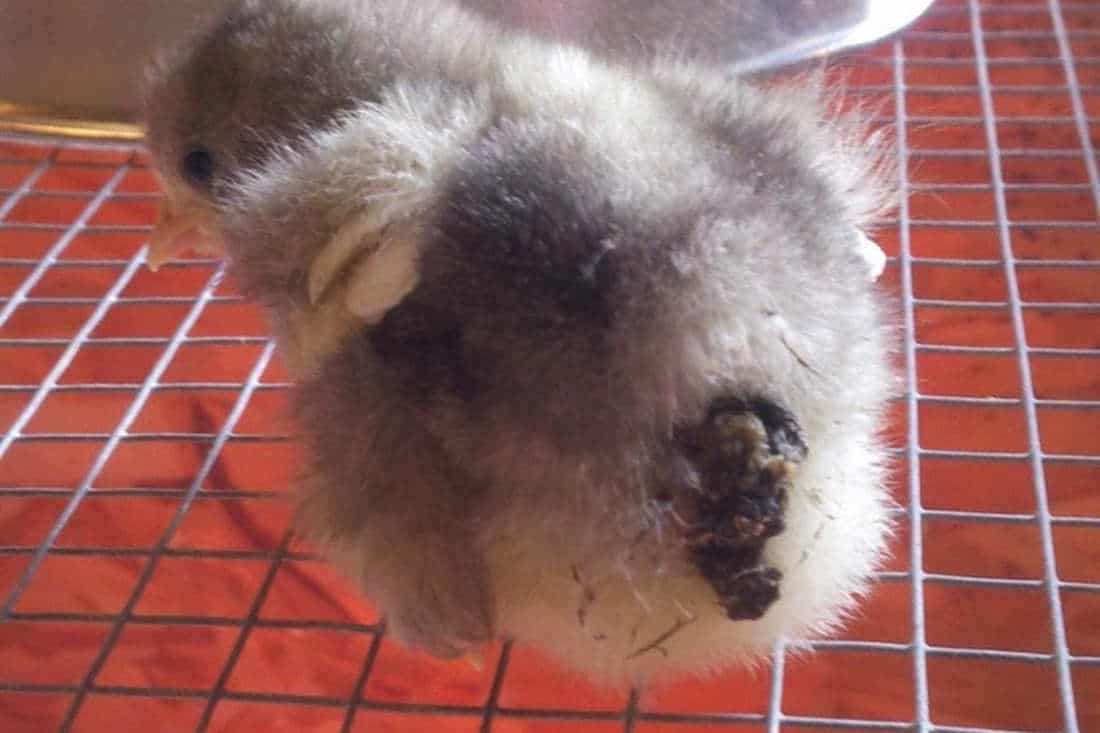
4. Infectious Diseases
Sometimes, chicks can get infected with viruses and bacteria, leading to diarrhea, which is a risk factor for pasting.
5. Stress
Chicks sent by mail and those raised in incubators experience stress, which translates to pasting.
If you’re new to homesteading, and you’re buying baby chicks (usually under three days old), ensure you don’t get those with poop sticking to their vents. Also, ensure you check the chicks’ vents immediately after you get home. If any of them has a clogged vent, initiate treatment immediately, and keep an eye on them after that.
Treatment
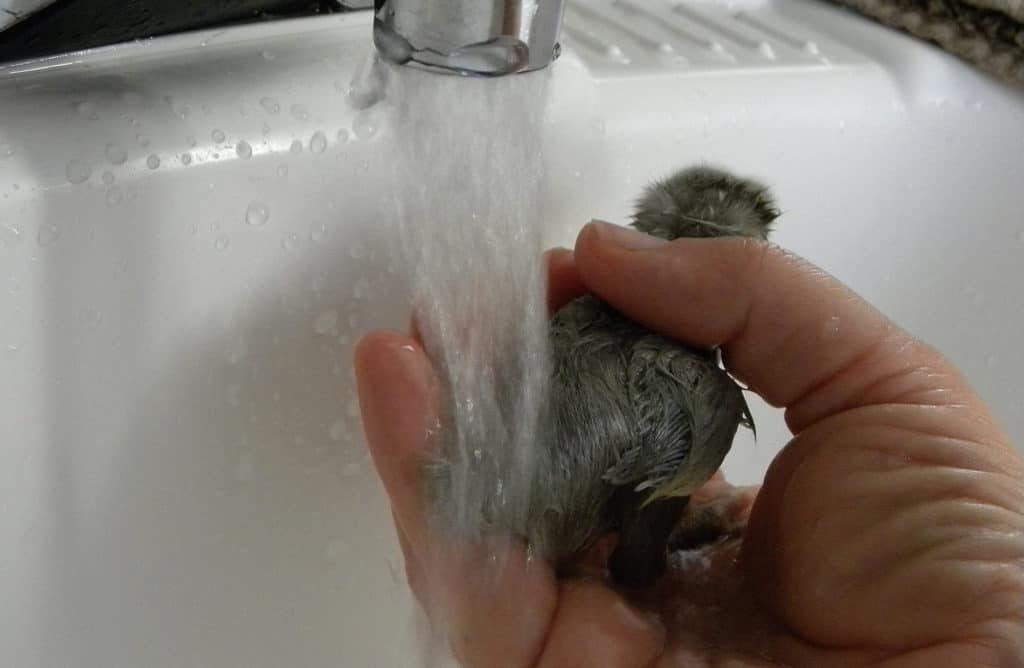
Here’s a routine of what we do to treat our baby chicks when they come down with pasty butt:
1. Clean up the Vent
The first thing to do is to clean the butt of the chick. Gently and softly wipe the butt with a napkin or washcloth dipped in warm water. Do not try to forcefully pull the excrement when it’s dry because you could tear the chick’s skin, and even damage the vent.
As an alternative, you can place the backside of the chick under running warm water. The warm water will help loosen the hardened poop and open up the vent. If the excreta is very dry, you can use a cotton swab to dislodge them. It’s a pretty straightforward process and takes just a couple of minutes to perform.
After cleaning the vent, dry the chick with a paper towel or a hairdryer set on low heat and held 10 inches away from the chick’s butt.
2. Use Vaseline
To prevent chaffing, I always apply Vaseline to the chick’s butt. After cleaning and drying the chick, take a little portion of Vaseline with a cotton wool applicator and apply it to areas surrounding the vent.
That way, the excreta won’t stick the next time the chick tries to poop. If you prefer a similarly effective but natural alternative, you can opt for olive oil.
3. Feed Them Cornmeal
The next thing is to put some cornmeal on a tray and let the chicks forage on them.
Prevention
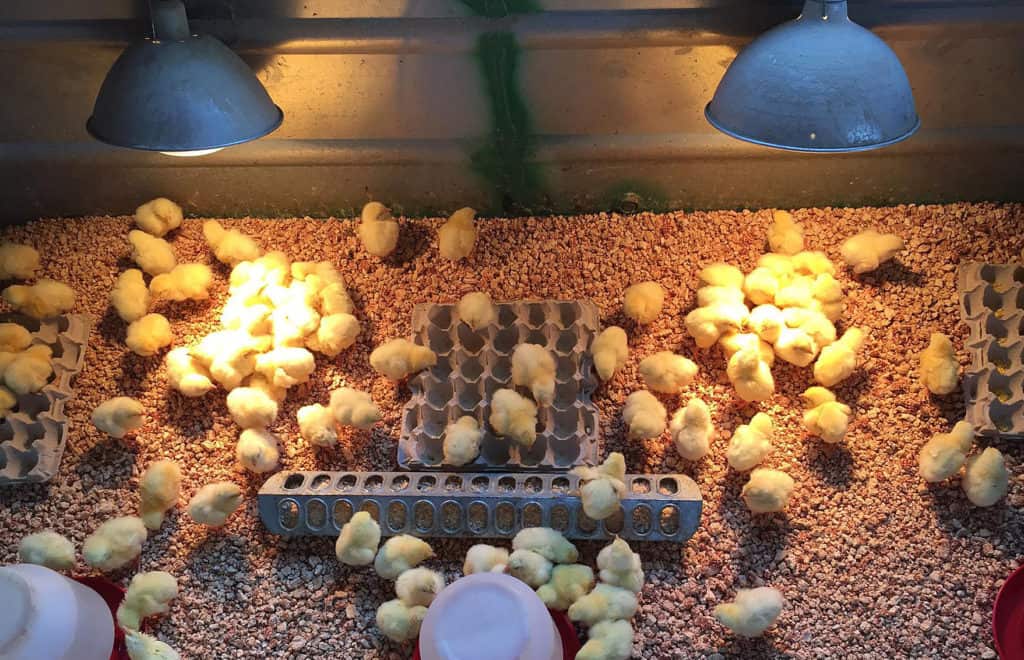
Just like with every disease, prevention is far more cost-effective and time-effective than treatment. It’s better to take the necessary steps to prevent your baby chickens from developing pasty butt in the first place. We’ve done the following over the last couple of years and had brilliant results
1. Pay Attention to Their Diet
What’s in their food? What’s in their water? In our poultry, we add probiotics to the chick’s water. Probiotics help boost the immune system by aiding digestion and the absorption of nutrients.
Besides probiotics, we also add organic apple cider vinegar to their water. This is a very common practice among poultry farmers. You can add two tablespoons to a quarter of the birds’ drinking water to prevent the clogging of their butt.
There is, however, no direct scientific evidence that organic apple cider vinegar can help prevent pasty butt, but it remains a healthy supplement.
2. Maintain the Right Brooder Temperature
Heat lamps are potentially hazardous, with a temperature far above the recommended average for brooding. Newly-hatched chickens flourish in places with temperature ranging from 60°F to 70°F.
As a rule, I don’t use heat lamps for my young chickens as they are arguably the most harmful heat source for baby chicks. Instead of heat lamps, I stick to alternatives like radiant heat plates, which are remarkably safer and more energy-efficient.
It’s also important to monitor the body temperature of the chicks. You can easily gauge their level of comfort by watching their position in the brooder; when they cluster while awake, they’re probably cold. Make necessary adjustments like increasing the room temperature to make the chicks comfortable.
3. Serve them Scrambled Eggs
Scramble up an egg and feed the chicks with it to supply them with protein. We do this immediately after cleaning up the chicks’ vents. We first learned of this method when we had recurring cases of pasting in our new poultry. Over half of our baby chicks had pasty butts, and we had to find a permanent solution.
What we did was mix scrambled eggs with the chick’s feed and offer it to them. It helped to clear things up, and we didn’t record any other incidence in those birds.
4. Keep the Brooder Clean and Comfortable
Keep your brooder clean to forestall bacteria growth and spread that could make the situation worse. The brooder has to be extremely comfortable for the young birds, with clean water and healthy feed available at all times.
Conclusion
Treating your baby chicks with a pasty butt is a pretty easy endeavor. However, ignoring it can lead to the chick’s death, so initiating immediate treatment is vital. Implementing preventive measures against pasting is a better way to reduce the likelihood of losing your chicks to the condition.
As a poultry owner, you must take the following steps in protecting your newly-hatched chicks from developing pasty butts:
- Pay attention to their diet
- Maintain the right brooder temperature
- Serve them scrambled eggs
- Keep the brooder clean and comfortable.
If you have any questions about pasty butt in chicks, feel free to drop them. I’ll respond to every one of them.

Joseph Hudson has been raising chickens for over 15 years. In 2018, he completed the Agriculture & Natural Resources program at Mt. San Antonio College. He currently raises over 1400 chickens on his 7.5-hectare farm. He keeps sharing his experience on raising healthy and happy chickens on Chicken Scratch The Foundry.
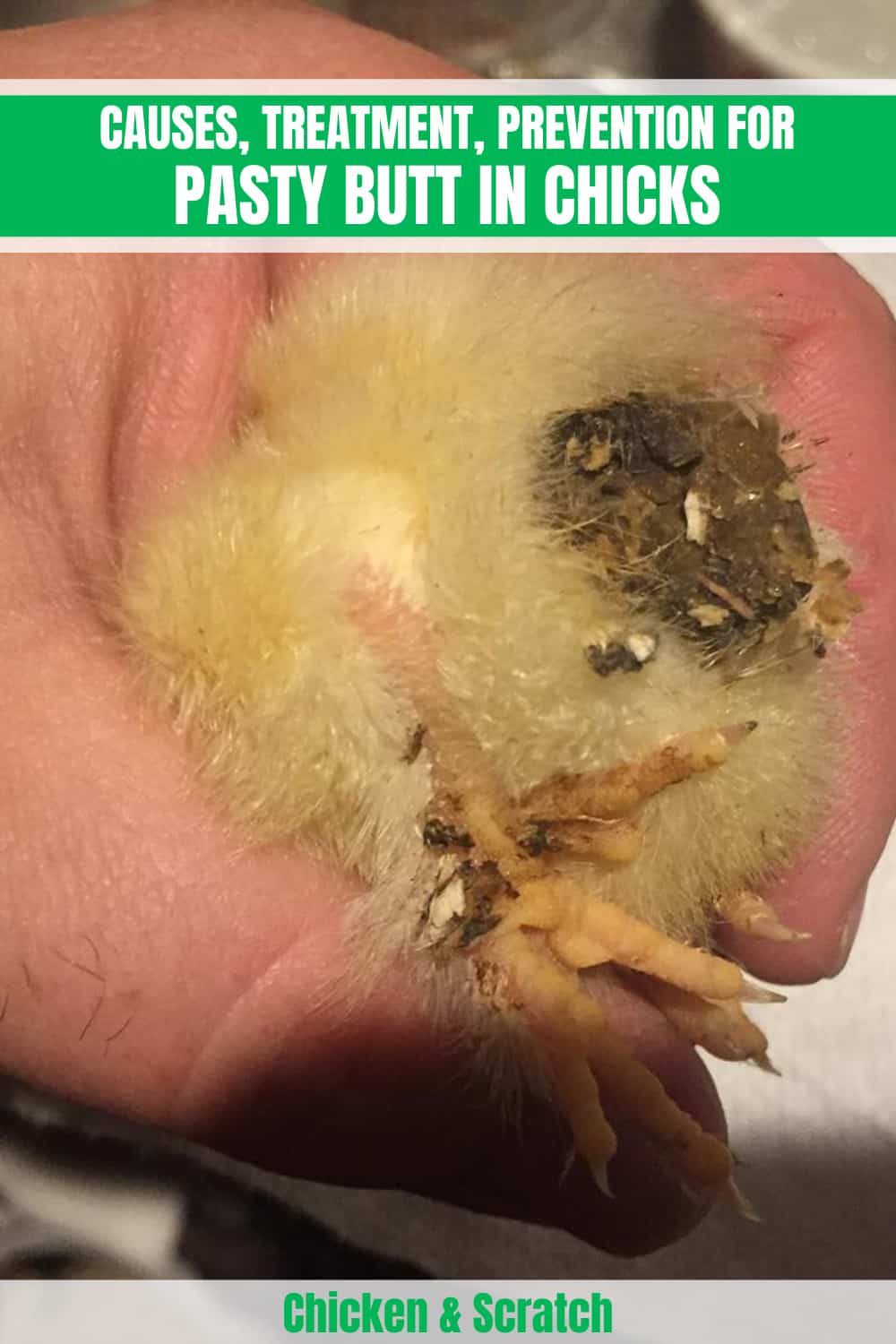







info very helpful my chix are 3 days old tow have pastybut one verybad wiped wit warm water still bad what more can we do to help them im new at this ty for your help
I let warm water from the faucet run on my chicks’ little butts. It softened everything so I could gently remove the “clog” from their chick-fuzz. (Hope that helps.) Dried them off and they’re now fighting over little bits of scrambled egg … running around like there’s not a lot more for everybody! LOL
Hi, when you say cornmeal, do you mean regular cooking cornmeal? Thank you.
I came home and one of my chicken had pasty mind you she didn’t have it in the morning she seemed weak I seen her butt and right away it looked a-little budged I clean her up and as soon as I released the poop an explosion of poop Squirted out it definitely released her but she’s acting tired. She did have alittle but if water I grabbed a t shirt and hurled the chicks together and she seems ti be calming down I hope she makes it through the night. I did read about putting vaseline in her little butt? Is there anything else I can do I did make her and her sisters eggs.
Hi, I have a chick that has had past butt ever since I brought it home from Tractor Supply- that was 4 weeks ago. I clean the vent daily, am feeding Dumor chick starter, and watching the temp in the brooder, and am offering grit and ground oats. I have 40 hens and roosters and have never had such a persistent case of pasty butt. All other chicks in the brooder are fine. Any suggestions? Thanks!
We raise leghorns. We have white, brown, silver and reds. The red ones are the only ones we have trouble with pasty butt. All the other ones are fine. The red ones are always the smallest of the bunch so we will try your suggestions. Could they be just a weak strain? Thanks
My sweet little leghorn got pasty butt. So I don’t think it’s breed specific.
3-24-23
Hello,
I’ve had to separate my Barred Rock chick from my four others because they stated pecking her rear end. She’s been having pasty butt problems since day 3, she is now 10 days old, but the pecking just started yesterday. I keep cleaning her and I placed a mirror in her enclosure but she is lonely. She chirps a lot. Her enclosure is now 88.9° . She is on medicated chick
starter feed. I am not sure what else to do.
Hi Sylvia,
I’m so sorry to hear about your Barred Rock chick’s pasty butt issue. It’s great that you’ve separated her from the others to avoid further pecking, and it sounds like you’re taking good care of her. The fact that you’re using medicated chick starter feed should help her stay healthy during this challenging time.
Keeping her enclosure at 88.9° is a good idea, but you might want to try adjusting the temperature slightly, as sometimes pasty butt can be related to temperature fluctuations. Make sure the chick has access to both warm and cooler spots so she can regulate her body temperature accordingly.
To help your chick with her loneliness, you might consider getting her a small stuffed animal as a companion. This can provide comfort and help reduce stress. Additionally, you can try spending more time with her and talking to her softly to make her feel more secure.
It’s important to keep monitoring her condition and make sure she’s eating and drinking properly. You can also try adding a little apple cider vinegar (about a teaspoon per quart) to her water, which can help improve her gut health and potentially prevent pasty butt.
If the issue persists, it might be a good idea to consult a veterinarian who specializes in avian care. They could provide more specialized advice and treatment options.
Keep up the good work, and I hope your little chick gets better soon! 🐥💕
Try mixing turmeric powder with water. Put that on her where other chicks peck. I’ve stopped older hens from picking on each other and pulling out feathers that way. Something about the orange turmeric makes them not wanna peck but it’s completely safe for them.
One of our chics we noticed today had pasty butt. We soaked her bottom in just a little warm water, then swabbed it with olive oil. It did come off, but she is very loud and just standing in one spot. We are worried we’re going to lose her. Is this normal after treating this? Also what probiotic do you get for your chics water? Thanks for all the helpful information!
Hello Amber!
It’s great to hear that you were able to treat your chick’s pasty butt using warm water and olive oil. It’s common for chicks to be a bit loud and stressed after such a treatment, as it can be an uncomfortable experience for them. Give your chick some time to recover and observe her behavior to see if there’s any improvement.
Regarding your concern about your chick standing in one spot, make sure to keep an eye on her and check for any signs of improvement or worsening of her condition. Make sure she has access to fresh water and proper nutrition to help her regain her strength.
As for probiotics, there are various options available for chick water. You can find commercial probiotic powders specifically designed for poultry at your local farm supply store or online. Follow the instructions on the packaging to ensure the proper dosage for your chicks. Alternatively, you can add a small amount of unflavored, unsweetened yogurt to their feed, as it naturally contains probiotics.
I hope this helps, and I’m glad that you found the article useful! If you have any more questions or concerns, please don’t hesitate to ask. Wishing the best for you and your chicks!